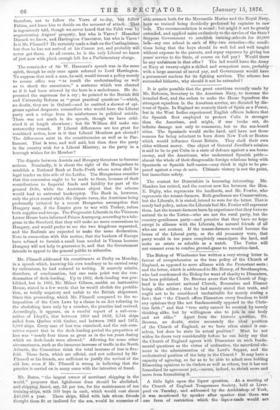The remain der of Sir W. Harcourt's speech was in
the same spirit, though he only once again referred to Lord Harlington. To suppose that such a man, he said, would invent a policy merely to secure office was "to insult the understanding as well as to shock the conscience," a sentence which was cheered as if it had been uttered by the hero in a melodrama. He de- precated the eagerness for a cry ; he pointed to the Burials Bill and University Reform as "great practical questions "—which, no doubt, they are in Oxford—and he emitted a shower of epi- grams against desperate counsellors who would have the Liberal party seek a refuge from its misfortunes in political suicide. There was not much in the speech, though we have criti- cised it at length elsewhere ; but Sir William did make one noteworthy remark. If Liberal differences are too great for combined action, how is it that Liberal Members get elected? The differences exist in the constituencies as well as in Par- liament. That is true, and well said, but then does the party in the country wish for a Liberal Ministry, as the party in a borough wishes for its Member?


































 Previous page
Previous page